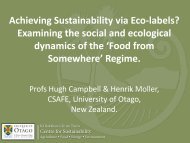Book of Abstract (incl. addendum) - IFSA symposium 2012
Book of Abstract (incl. addendum) - IFSA symposium 2012
Book of Abstract (incl. addendum) - IFSA symposium 2012
You also want an ePaper? Increase the reach of your titles
YUMPU automatically turns print PDFs into web optimized ePapers that Google loves.
Workshop 1.2 Family Farms as Educational Farms – Possibilities and Perspectives<br />
owners and workers as well as the transparency <strong>of</strong> agricultural production processes. As a<br />
consequence, young people today lack opportunities to get into contact with agriculture. Yet, society<br />
has to cope with agriculturally-induced problems and to contribute to sustainable development. But<br />
how shall today´s young people do so in the future if they have hardly any relation to farming?<br />
One attempt to answer this question is to bring agriculture closer to young people by means <strong>of</strong><br />
targeted educational activities. Many out-<strong>of</strong>-class learning locations do so trying to actively develop a<br />
basic understanding <strong>of</strong> agricultural production and its environmental, social and economic impacts.<br />
School farms e.g. <strong>of</strong>fer a whole week stay on a farm for school classes, involving their active<br />
participation in different fields <strong>of</strong> primary food production and processing. They intend to make young<br />
people get interested in agriculture since interest is widely considered as an important condition for<br />
learning.<br />
The aim <strong>of</strong> our study is to evaluate i) whether school farms are able to trigger and develop an<br />
interest in agriculture and ii) whether a subsequent teaching unit at school helps to keep this interest<br />
alive. The teaching unit contains four different treatments that systematically vary elements to trigger<br />
and maintain interest in a 2x2 design. Pupils´ interest in agriculture will be analysed in an extended<br />
pre-post test design before and after a week´s stay on a school farm and after the subsequent teaching<br />
unit at school. The presentation will outline the research design and display preliminary findings <strong>of</strong> the<br />
ongoing study.<br />
Farm Based Education and Farm to School in the United States: Networks,<br />
Case Studies, Best Practices<br />
Erica Curry<br />
Farm Based Education Association, Shelburne Farms, Vermont (U.S.)<br />
Ecurry@shelburnefarms.org<br />
Over the last decade there has been a substantial increase in the interest <strong>of</strong> food and agriculture in the<br />
United States. This movement has been referred to as the “local food movement” and is embodied by<br />
communities in a variety <strong>of</strong> ways. Farm Based Education (FBE) and Farm to School (FTS) programs<br />
provide key opportunities for communities to build healthier local food systems across the country. The<br />
Farm Based Education Association and National Farm to School Network are both national networks<br />
that support practitioners working in these fields.<br />
The aim <strong>of</strong> a presentation at workshop 1.2 is to share information with the <strong>IFSA</strong> Community<br />
about the FBE and FTS movements in the United States. This presentation will be an engaging<br />
opportunity to hear about how this work relates to the Green Care movement in Europe. The<br />
presentation will <strong>incl</strong>ude the following elements:<br />
• Discussion <strong>of</strong> the Best Practices <strong>of</strong> FBE and FTS in the United States<br />
• Case Studies <strong>of</strong> FBE and FTS programs across the country, <strong>incl</strong>uding Michael Kaufmann<br />
from Green Chimneys in New York State. Founded in 1947 and a member <strong>of</strong> the FBEA,<br />
Green Chimneys is a nationally renowned, non-pr<strong>of</strong>it therapeutic organization that restores<br />
possibilities and creates futures for children with emotional, behavioral, social and learning<br />
challenges.<br />
• Highlights <strong>of</strong> research and evaluation results<br />
• A hands-on demonstration <strong>of</strong> a farm based education activity to emphasis the importance <strong>of</strong><br />
interactive learning.<br />
• An opportunity for dialogue and discussion about how to strengthen opportunities for<br />
learning and networking between the Green Care and FBE and FTS communities.<br />
23











